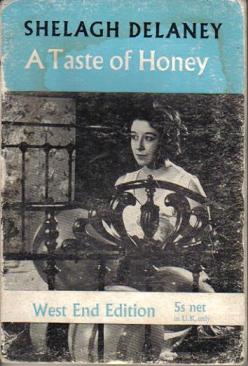
A Taste of Honey
A Taste of Honey is the first play by the British dramatist Shelagh Delaney, written when she was 19. It was adapted into an award-winning film of the same title in 1961.
For other uses, see A Taste of Honey (disambiguation).A Taste of Honey
Set in Salford in North West England, it tells the story of Jo, a working class schoolgirl, and her mother, Helen, who is presented as tarty, foul mouthed and promiscuous. Helen leaves Jo alone in their new flat after she begins a relationship with Peter, a flashy, moneyed "wide boy" who is younger than her. At the same time Jo, who is white, begins a romantic relationship with Jimmy, a black sailor. Despite being only 15, she tells him she is nearly 18 and therefore nearly old enough to marry without parental permission. He proposes marriage but then goes to sea, leaving Jo pregnant and alone. She finds lodgings with a gay acquaintance, Geoffrey, who assumes the role of surrogate father. Helen returns after leaving her lover and the future of Jo's new home is put into question.
A Taste of Honey was originally intended as a novel, but Delaney turned it into a play because she hoped to revitalise British theatre and address social issues that she thought were not being presented. The play was produced by Joan Littlewood's Theatre Workshop and premiered at the Theatre Royal Stratford East, a socialist fringe theatre in London, on 27 May 1958. It starred Frances Cuka as Jo and Avis Bunnage as her mother. The production then transferred to Wyndham's Theatre in the West End on 10 February 1959.
A Taste of Honey comments on, and puts into question, class, race, age of sexual consent, gender, sexual orientation and illegitimacy in mid-twentieth-century Britain. It became known as a "kitchen sink" play, part of a genre revolutionising British theatre at the time.
Reception[edit]
Writing of the original production, Milton Shulman in the Evening Standard found the play immature and unconvincing, and others were similarly derogatory about the author's age, with the Daily Mail writing that it tasted not of honey, but "of exercise books and marmalade."[6] However, Kenneth Tynan wrote "Miss Delaney brings real people on to her stage, joking and flaring and scuffling and, eventually, out of the zest for life she gives them, surviving” ; while Lindsay Anderson in Encore called the play "a work of complete, exhilarating originality," giving "a real escape from the middlebrow, middle-class vacuum of the West End."[6][7]
By way of a visual backdrop to A Taste of Honey, Delaney reflected on life in Salford in a documentary, directed by Ken Russell, for BBC television's Monitor that was broadcast on 26 September 1960.[8]
Popular references[edit]
The play was admired by Morrissey of the band The Smiths, who used Delaney's photo on the album cover artwork for Louder Than Bombs. A photograph of Shelagh Delaney appears on the cover for The Smiths' single "Girlfriend in a Coma". "This Night Has Opened My Eyes", an earlier Smiths song, is based on the play and includes a paraphrase of Geoffrey's line to Jo near the end: "The dream has gone but the baby is real." Morrissey's lyrics include other borrowings from Delaney, such as "river the colour of lead" and "I'm not happy and I'm not sad", both of which are spoken by the lead character Jo. Other quotations and near-quotations appear in several other songs by The Smiths and Morrissey.[9]
The play is referred to by Akira the Don in the title track on the album Thieving (2008), in which it appears to awaken him to literature in a school English lesson.
It appears in On Chesil Beach by Ian McEwan as a film watched by the main characters.